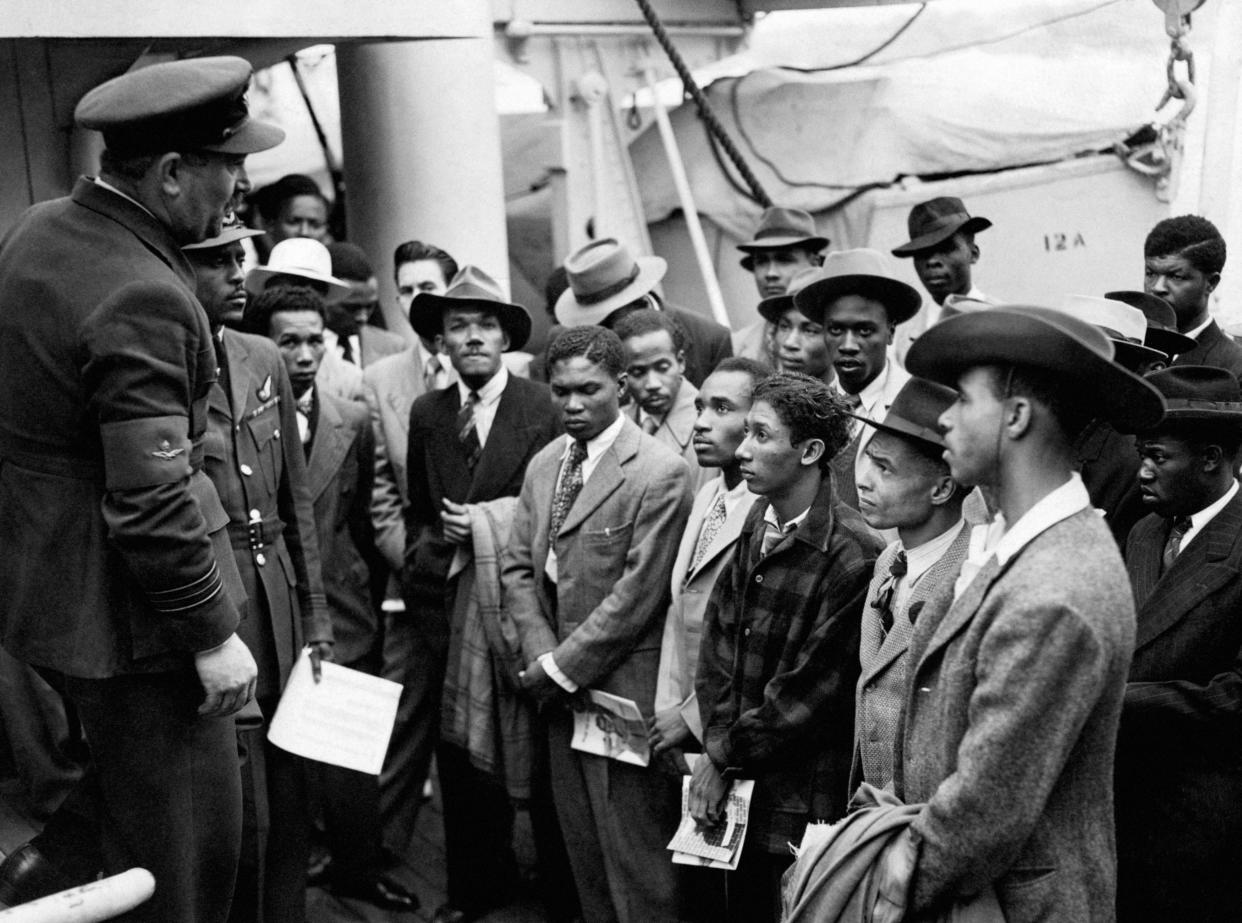Windrush generation: Who are they and why are they threatened with deportation?

The government has been accused of being “cruel and inhumane” in its treatment of the Windrush generation, who have been threatened with deportation from the UK.
Prime minister Theresa May will meet Caribbean leaders on Tuesday, a day after home secretary Amber Rudd apologised in the House of Commons for the “appalling” treatment of people who arrived in Britain as long ago as the 1940s.
WHO ARE THE WINDRUSH GENERATION?
The Windrush generation are people from the Caribbean who were invited to the UK to help rebuild the country amid labour shortages in the years after World War II.
They take their name from the SS Empire Windrush ship, which brought 492 passengers to Tilbury Dock, Essex, on June 22, 1948 after an 8,000-mile journey from Jamaica, Trinidad and Tobago and other Caribbean islands.
Many of the passengers were former servicemen who had fought with the UK during the war and many other passengers were children.
It is difficult to say how many people belong to the Windrush generation, as many of the children travelled on their parents’ passports and didn’t apply for travel documents, but the figure is thought to be in the thousands.

There are 500,000 people living in the UK who were born in a Commonwealth country and arrived before 1971, including the Windrush arrivals.
The 1971 Immigration Act gave Commonwealth citizens in the UK indefinite leave to remain, while new arrivals with British passports had to have a work permit and proof that a parent or grandparent had been born in the UK.
MOST POPULAR TODAY ON YAHOO
Couple furious after Morrisons refuse to sell them meat pies before 9am
US military killed 200 Russia troops in Syria airstrikes, claims Trump ally
Eight legged treats: Restaurant offers TARANTULA as a burger topping
Russia carries out cyber attack targeting ‘critical infrastructure’ across the world
WHY ARE THE WINDRUSH GENERATION CONCERNED?
The Home Office didn’t keep a record of those who were granted leave to remain in the UK or issue any paperwork to confirm this, leaving the Windrush generation with difficulty proving they are in Britain legally.
Because they travelled from British colonies that had not gained independence, they thought they were British citizens.
Recent changes to immigration laws require people to have documentation to work, access benefits or rent a property.
The result is that thousands of Caribbean immigrants cannot prove they have the right to work in the UK or access NHS services, or even remain in the country.
WHAT HAS THE GOVERNMENT SAID?
In the Commons on Monday, Ms Rudd acknowledged the Home Office had become “too concerned with policy and strategy” at the expense of the individual.
“I do not want any of the Commonwealth citizens who are here legally to be impacted in the way they have,” she told MPs.
“Frankly, some of the ways they have been treated has been wrong, has been appalling and I am sorry.”
Ms Rudd said fees for sorting out the paperwork of those affected would be waived so they could have their status confirmed free of charge.

She said she had also given instructions that there were “no removals or detention” of Commonwealth citizens under the new assistance scheme.
A cross-party group of 140 MPs wrote to Mrs May calling for an “immediate and effective” response to problems faced by members of the Windrush generation.
HAVE PEOPLE BEEN DEPORTED?
Cabinet Office minister David Lidington said that the Home Office was still not aware of any cases where Windrush generation Britons had been deported.
There had been confusion on Monday after immigration minister Caroline Nokes appeared to suggest that some individuals may already have been deported in error.
Home Secretary Amber Rudd later told MPs she was not aware of any specific cases.
On Tuesday, Mr Lidington told BBC Radio 4’s Today: “I talked to the home secretary about this last night and the position is that we have no information.
“We don’t know of any cases where someone has been deported from this category.”
My office has just received a call from Windrush Generation mother of a man who is being deported tomorrow. Cease this deportation immediately @AmberRuddHR @carolinenokes @ukhomeoffice @theresa_may pls RT: #EndWindrushDeportations https://t.co/0ir4wEy4Cn
— David Lammy (@DavidLammy) April 17, 2018
Ms Ruth Williams, 75 years old Windrush citizen and mother of a son facing deportation: I feel betrayed and a second class citizen in my own country. This makes me so sad and the Home Office must show some compassion.
— David Lammy (@DavidLammy) April 17, 2018
Ms Ruth Williams, 75 years old Windrush citizen and mother of a son facing deportation: I am unwell and almost 75, I live on my own and I need my son to stay here. I need my family around me and I can’t face being alone. He has apple Home Office and been refused twice.
— David Lammy (@DavidLammy) April 17, 2018
But David Lammy, the Labour MP for Tottenham who organised the letter to the prime minister, tweeted on Tuesday that his office had been contacted about the case of Mozi Haynes, 35, who is being deported tomorrow.
He said the man’s mother, Ruth Williams, 75, told his office she felt “betrayed and a second class citizen in my own country”.
Mr Lammy said the man is a constituent of Dominic Grieve, the Conservative MP for Beaconsfield, who has been passed the case details.
Mr Lammy’s office said Ms Williams is a member of the Windrush generation whose son applied to the Home Office to “regularise his status in 2016 and his application was subsequently rejected”.
The office said he is due to be deported on Wednesday.
Mr Lammy said: “This is a national disgrace. What is going on in the Home Office makes me ashamed of our great country.
“The prime minister must act urgently to halt this deportation and all other Windrush deportations. Heads must roll over this and the Home Secretary and immigration minister must consider their positions.”
WHAT HAS BEEN THE REACTION?
Mr Lammy said the home secretary should know the numbers of people who had been deported as he asked how many had been detained, denied healthcare, been refused pensions or lost their jobs.

He told the Commons on Monday: “This is a day of national shame and it has come about because of a hostile environment policy that was begun under her prime minister.
“Let us call it as it is. If you lay down with dogs, you get fleas, and that is what has happened with this far-right rhetoric in this country.”
Mr Lammy said it was “inhumane and cruel” that so many people had had to live with such uncertainty for so long.

 Yahoo News
Yahoo News 

